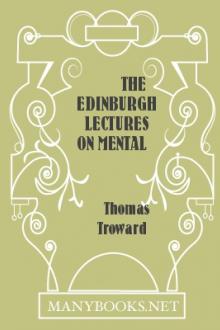The Edinburgh Lectures on Mental Science, Thomas Troward [novel books to read TXT] 📗

- Author: Thomas Troward
- Performer: -
Book online «The Edinburgh Lectures on Mental Science, Thomas Troward [novel books to read TXT] 📗». Author Thomas Troward
By thus making intelligent use of our subjective mind, we, so to speak, create a nucleus, which is no sooner created than it begins to exercise an attractive force, drawing to itself material of a like character with its own, and if this process is allowed to go on undisturbed, it will continue until an external form corresponding to the nature of the nucleus comes out into manifestation on the plane of the objective and relative. This is the universal method of Nature on every plane. Some of the most advanced thinkers in modern physical science, in the endeavour to probe the great mystery of the first origin of the world, have postulated the formation of what they call "vortex rings" formed from an infinitely fine primordial substance. They tell us that if such a ring be once formed on the minutest scale and set rotating, then, since it would be moving in pure ether and subject to no friction, it must according to all known laws of physics be indestructible and its motion perpetual. Let two such rings approach each other, and by the law of attraction, they would coalesce into a whole, and so on until manifested matter as we apprehend it with our external senses, is at last formed. Of course no one has ever seen these rings with the physical eye. They are one of those abstractions which result if we follow out the observed law of physics and the unavoidable sequences of mathematics to their necessary consequences. We cannot account for the things that we can see unless we assume the existence of other things which we cannot; and the "vortex theory" is one of these assumptions. This theory has not been put forward by mental scientists but by purely physical scientists as the ultimate conclusion to which their researches have led them, and this conclusion is that all the innumerable forms of Nature have their origin in the infinitely minute nucleus of the vortex ring, by whatever means the vortex ring may have received its initial impulse, a question with which physical science, as such, is not concerned.
As the vortex theory accounts for the formation of the inorganic world, so does biology account for the formation of the living organism. That also has its origin in a primary nucleus which, as soon as it is established, operates as a centre of attraction for the formation of all those physical organs of which the perfect individual is composed. The science of embryology shows that this rule holds good without exception throughout the whole range of the animal world, including man; and botany shows the same principle at work throughout the vegetable world. All branches of physical science demonstrate the fact that every completed manifestation, of whatever kind and on whatever scale, is started by the establishment of a nucleus, infinitely small but endowed with an unquenchable energy of attraction, causing it to steadily increase in power and definiteness of purpose, until the process of growth is completed and the matured form stands out as an accomplished fact. Now if this be the universal method of Nature, there is nothing unnatural in supposing that it must begin its operation at a stage further back than the formation of the material nucleus. As soon as that is called into being it begins to operate by the law of attraction on the material plane; but what is the force which originates the material nucleus? Let a recent work on physical science give us the answer; "In its ultimate essence, energy may be incomprehensible by us except as an exhibition of the direct operation of that which we call Mind or Will." The quotation is from a course of lectures on "Waves in Water, Air and Æther," delivered in 1902, at the Royal Institution, by J. A. Fleming. Here, then, is the testimony of physical science that the originating energy is Mind or Will; and we are, therefore, not only making a logical deduction from certain unavoidable intuitions of the human mind, but are also following on the lines of the most advanced physical science, when we say that the action of Mind plants that nucleus which, if allowed to grow undisturbed, will eventually attract to itself all the conditions necessary for its manifestation in outward visible form. Now the only action of Mind is Thought; and it is for this reason that by our thoughts we create corresponding external conditions, because we thereby create the nucleus which attracts to itself its own correspondences in due order until the finished work is manifested on the external plane. This is according to the strictly scientific conception of the universal law of growth; and we may therefore briefly sum up the whole argument by saying that our thought of anything forms a spiritual prototype of it, thus constituting a nucleus or centre of attraction for all conditions necessary to its eventual externalization by a law of growth inherent in the prototype itself.
VI. THE LAW OF GROWTH.A CORRECT understanding of the law of growth is of the highest importance to the student of Mental Science. The great fact to be realized regarding Nature is that it is natural. We may pervert the order of Nature, but it will prevail in the long run, returning, as Horace says, by the back door even though we drive it out with a pitchfork; and the beginning, the middle, and the end of the law of Nature is the principle of growth from a vitality inherent in the entity itself. If we realize this from the outset we shall not undo our own work by endeavouring to force things to become that which by their own nature they are not. For this reason when the Bible says that "he who believeth shall not make haste," it is enunciating a great natural principle that success, depends on our using, and not opposing, the universal law of growth. No doubt the greater the vitality we put into the germ, which we have agreed to call the spiritual prototype, the quicker it will germinate; but this is simply because by a more realizing conception we put more growing-power into the seed than we do by a feebler conception. Our mistakes always eventually resolve themselves into distrusting the law of growth. Either we fancy we can hasten it by some exertion of our own from without, and are thus led into hurry and anxiety, not to say sometimes into the employment, of grievously wrong methods; or else we give up all hope and so deny the germinating power of the seed we have planted. The result in either case is the same, for in either case we are in effect forming a fresh spiritual prototype of an opposite character to our desire, which therefore neutralizes the one first formed, and disintegrates it and usurps its place. The law is always the same, that our Thought forms a spiritual prototype which, if left undisturbed, will reproduce itself in external circumstances; the only difference is in the sort of prototype we form, and thus evil is brought to us by precisely the same law as good.
These considerations will greatly simplify our ideas of life. We have no longer to consider two forces, but only one, as being the cause of all things; the difference between good and evil resulting simply from the direction in which this force is made to flow. It is a universal law that if we reverse the action of a cause we at the same time reverse the effect. With the same apparatus we can commence by mechanical motion which will generate electricity, or we can commence with electricity which will generate mechanical motion; or to take a simple arithmetical instance: if 10/2 = 5, then 10/5 = 2; and therefore if we once recognize the power of thought to produce any results at all, we shall see that the law by which negative thought produces negative results is the same by which positive thought produces positive results. Therefore all our distrust of the law of growth, whether shown in the anxious endeavour to bring pressure to bear from without, or in allowing despair to take the place of cheerful expectation, is reversing the action of the original cause and consequently reversing the nature of the results. It is for this reason that the Bible, which is the most deeply occult of all books, continually lays so much stress upon the efficiency of faith and the destructive influence of unbelief; and in like manner, all books on every branch of spiritual science emphatically warn us against the admission of doubt or fear. They are the inversion of the principle which builds up, and they are therefore the principle which pulls down; but the Law itself never changes, and it is on the unchangeableness of the law that all Mental Science is founded. We are accustomed to realize the unchangeableness of natural law in our every day life, and it should therefore not be difficult to realize that the same unchangeableness of law which obtains on the visible side of nature obtains on the invisible side as well. The variable factor is, not the law, but our own volition; and it is by combining this variable factor with the invariable one that we can produce the various results we desire. The principle of growth is that of inherent vitality in the seed itself, and the operations of the gardener have their exact analogue





Comments (0)